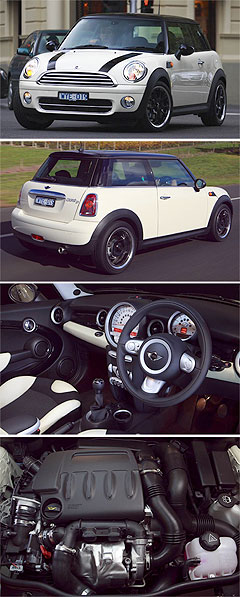New models - Mini - Hatch - DFirst drive: Lean diesel Mini here – at lastMinimal: The new Mini D diesel gets 3.9L/100km fuel economy. Mini D pips hybrids in fuel-sipper bragging rights, but auto versions thirstier20 May 2009 AUSTRALIA finally gets the diesel-powered Mini Cooper this week, about 18 months later than once expected but in a timely fashion with its extraordinary fuel consumption and emissions levels given the current focus on green cars and running costs. Priced at $33,750, the Mini Cooper D costs $2650 more than the standard Mini, which is identically equipped with the exception of the eco-conscious new car’s fuel-saving idle-stop function and regenerative braking system. The new Mini Cooper D arrives in showrooms claiming the title as the most fuel-efficient car in the country with a hybrid-beating official combined consumption figure of just 3.9L/100km thanks to a number of technical developments the company calls ‘Minimalism’. And, as Mini Australia national manager Justin Hocevar was quick to point out, the new Mini diesel combines ultra-low fuel use and emissions (emitting just 104g/km of CO2) with the sort of performance expected of a BMW-bred machine. The Mini Cooper D accelerates from 0-100km/h in 9.9 seconds with the standard six-speed manual (10.3 seconds for the auto) and has a top speed of 195km/h (auto: 190km/h). That compares with 9.1 seconds and 203km/h for the regular 1.6-litre petrol-engined Mini, but we have no comparative figures yet for in-gear acceleration, which could reveal the diesel’s strength.  Unfortunately, the optional six-speed auto with steering wheel paddles not only costs an extra $2350 and adds 30kg of weight but also increases fuel consumption by an unimpressive 1.1L/100km to 5.0L/100km/h (while the city figure rises an extraordinary 1.8L/100km to 6.5L/100km). Unfortunately, the optional six-speed auto with steering wheel paddles not only costs an extra $2350 and adds 30kg of weight but also increases fuel consumption by an unimpressive 1.1L/100km to 5.0L/100km/h (while the city figure rises an extraordinary 1.8L/100km to 6.5L/100km).“For the first time in Australia, buyers will be able to buy an extremely fuel-efficient car, with very low emissions, without having to sacrifice excitement and performance,” said Mr Hocevar. “Thanks to Minimalism, buyers do not have to forego typical Mini levels of driving fun, premium quality and safety and a host of personalisation opportunities when they decide to purchase an efficient car.” Mr Hocevar claimed that the Mini Cooper D was the first overtly sporty diesel small car, and demonstrated the potential of modern diesel engines more impressively than ever. He estimated that owners driving the national average 15,000km a year would spend just $15 a week on fuel. That would be only a little higher for drivers in city conditions, thanks to the idle-stop function. With only a 40-litre tank, the Mini D is still claimed to be able to get from Melbourne to Sydney without refuelling. Although the Mini diesel sneaks under the guard of the current Toyota Prius hybrid – which has fuel consumption of 4.4L/100km and CO2 emissions of 106g/km – the Japanese company’s third-generation hybrid will soon arrive with a promise of a Mini-matching 3.9L/100km fuel figure and an outstanding emissions level of just 89g/km. Honda is likely to undercut both rivals on price with its new Insight, but will not be able to match the environmental credentials of either car when it eventually arrives in Australia – delayed until at least the first half of 2010 due to its runaway success in Japan, where it was the top-selling car last month. Mini’s Minimalism technology includes not only the idle-stop function and regenerative braking – normally associated with hybrid-electric cars but previously available in the M3 and 7 Series – but also energy-sapping oil and water pumps that turn off automatically when not required, electric power steering assistance and a gearshift indicator to tell the driver the best time to upshift. An underbody panel is fitted to reduce aerodynamic drag, and aluminium components are used in both the engine and chassis to keep the weight down, but the Cooper D still comes in 25kg above the standard Mini. The PSA Peugeot-Citroen-sourced 1.6-litre turbo-diesel engine’s common-rail direct-injection operates at 1600 bar of pressure, and the turbocharger – said to be designed specifically for the Mini – uses variable-vane technology to ensure strong performance across all engine speeds. It produces only 80kW of power (88kW for the 1.6-litre petrol), but torque peaks at 240Nm at just 1750rpm (versus 128Nm at 5500rpm). Like the turbocharged petrol Cooper S, there is also an overboost function that adds another 20Nm of torque when you floor the throttle. Larger induction plumbing needed for the engine has required the Mini’s bonnet bulge to be pumped up, but, apart from the D badge on the rear, the only significant external identification of the newest Cooper variant is a larger, split horizontal air intake below the bumper that feeds the heat exchanger. Like the regular Mini Cooper range, there is also an up-spec Chili model that costs an extra $2650 and gains features such as a rear spoiler, bigger 16-inch alloy wheels, leather upholstery features, fog lights, sports seats and upgraded audio. Read more:Diesel Mini for OzMini D, 735d coming All new models Alfa Romeo Alfa Romeo Abarth Abarth Audi Audi Aston Martin Aston Martin BMW BMW Bentley Bentley Chrysler Chrysler Chevrolet Chevrolet Dodge Dodge Citroen Citroen Ferrari Ferrari DS DS Ford Ford Fiat Fiat FPV FPV Foton Foton Haval Haval Great Wall Great Wall Honda Honda Holden Holden Hyundai Hyundai HSV HSV Isuzu Isuzu Infiniti Infiniti Jeep Jeep Jaguar Jaguar Lamborghini Lamborghini Kia Kia Lexus Lexus Land Rover Land Rover Mazda Mazda Maserati Maserati Mercedes-Benz Mercedes-Benz McLaren McLaren Mini Mini Nissan Nissan Mitsubishi Mitsubishi Peugeot Peugeot Opel Opel Proton Proton Porsche Porsche Renault Renault Ram Ram Saab Saab Rolls-Royce Rolls-Royce Smart Smart Skoda Skoda Subaru Subaru SsangYong SsangYong Tesla Tesla Suzuki Suzuki Toyota Toyota Volvo VolvoHatch pricing
Motor industry news |
|














Facebook Twitter Instagram